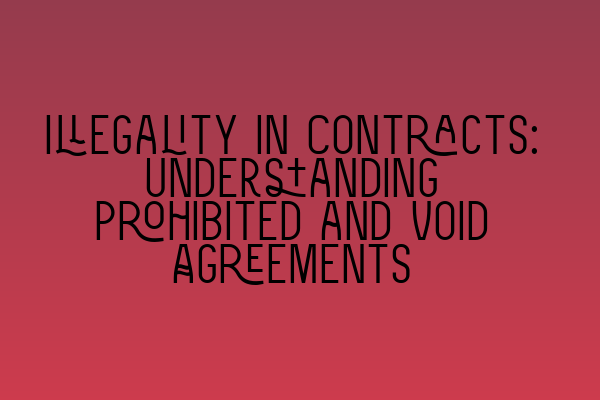Illegality in Contracts: Understanding Prohibited and Void Agreements
In the world of contract law, one concept that often raises eyebrows is the notion of “illegality.” Contracts that involve illegal activities or contravene public policy are considered void or unenforceable. It’s vital for individuals and businesses alike to understand the implications of prohibited agreements to ensure their contracts are legally binding and protect their interests.
What is an Illegal Contract?
An illegal contract, as the term suggests, is an agreement that involves outright illegal activities. These activities can range from criminal conduct, such as drug trafficking or money laundering, to engaging in activities that are prohibited by statute or common law.
When a contract is deemed illegal, it means that the courts will not enforce it. Neither party can seek legal remedies for non-performance or breach of contract. The underlying principle behind this stance is that the law should not provide assistance or protection to those engaged in illegal or morally reprehensible activities.
Prohibited Contracts versus Void Agreements
While the terms “illegal” and “void” are often used interchangeably, they have different legal connotations.
Prohibited Contracts: These contracts involve activities that are specifically prohibited by law. For instance, a contract to sell drugs or commit fraud falls squarely into this category. Prohibited contracts are void ab initio, which means they are void from the outset, regardless of whether any actions have been taken to fulfill the agreement.
Void Agreements: Void agreements, on the other hand, are contracts that may not necessarily involve illegal activities, but they still contravene public policy. These agreements are not entirely illegal, but they are unenforceable by virtue of public policy considerations. Some examples of void agreements include contracts that undermine the administration of justice or those that restrict freedom of marriage.
Understanding the Consequences of Illegality in Contracts
When a contract is deemed illegal or void, it cannot be enforced by either party. The courts will refuse to award damages or provide any remedies for non-performance.
Additionally, any money or assets exchanged under an illegal contract may be subject to forfeiture. This is because the law aims to discourage individuals from benefiting from their own wrongdoing.
It is crucial to note that whether a contract is deemed illegal will depend on the jurisdiction and the specific laws in place. Each case is evaluated on its own merits, considering factors such as public policy considerations and the nature of the illegal conduct.
Avoiding Illegality in Contracts
To ensure your contracts are legally binding and enforceable, it is essential to adhere to the following best practices:
1. Familiarize yourself with the laws: Stay updated on the relevant statutes and regulations in your jurisdiction to understand what activities are unlawful or contrary to public policy. Seek legal advice if necessary.
2. Draft contracts carefully: Pay close attention to the terms of your contract to ensure they do not unwittingly involve prohibited activities. Clearly define the rights and obligations of each party and ensure they comply with the law.
3. Consider the consequences: Before entering into any agreement, weigh the potential legal implications. If there is uncertainty surrounding any aspect of the contract’s legality, seek professional legal advice to avoid future complications.
4. Perform due diligence: Conduct thorough background checks on potential contracting parties to ensure they are reputable and not involved in illegal activities. This will help mitigate risk and protect your interests.
Conclusion
Understanding the concept of illegality in contracts is vital for individuals and businesses alike. Prohibited and void agreements can have severe consequences, rendering contracts unenforceable and exposing parties to potential legal liabilities.
By familiarizing yourself with applicable laws, drafting contracts carefully, considering the consequences, and performing due diligence, you can minimize the risk of inadvertently entering into illegal agreements. Consulting with a qualified solicitor will provide you with the necessary guidance and ensure your contracts are legally sound and protect your interests.
Remember, legality is the foundation of contract law, and adherence to it is crucial for upholding justice, protecting public interest, and maintaining the integrity of business dealings.
